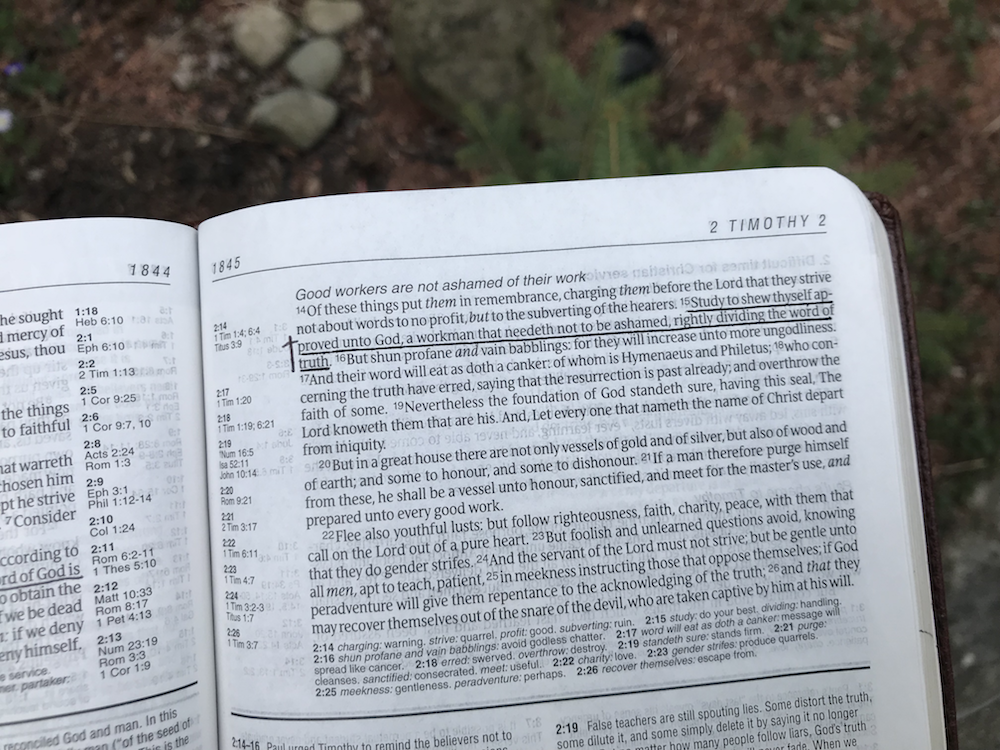
The Bible is big, and it can be hard to know where to start. We can easily feel intimidated and leave the hard work of studying the Bible to the professionals. With so many different opinions on the Bible’s interpretation, it may seem impossible to draw the right conclusions. However, just as God desires to communicate with mankind, He also intended for His Word to be understood. Biblical hermeneutics can help you grow confident in studying God’s Word and interpreting Scripture.
What is the definition of biblical hermeneutics?
Biblical hermeneutics is the study of the principles of interpreting God’s Word.
A Discipline: The study of God’s Word must be conducted within the context of our relationship to and dependence upon God. View the hermeneutics process, not as an avenue to conquer God’s Word, but to properly understand God’s Word that it may conquer our hearts.
A Science: Biblical hermeneutics follows certain processes, resulting in an understanding of the text. Through systematic study, we can find consistency as we seek to understand God’s Word.
An Art: We gain a feel for the significance to ascribe to certain parts of the hermeneutic process, and gain skill in recognizing where our attention will prove to be most beneficial.
What is the purpose of biblical hermeneutics?
The purpose of biblical hermeneutics is to understand what the Scriptures communicated to the original audience and what timeless principles and applications there are for us. We need to understand this to live in line with the truth that God has revealed in His Word.
How can hermeneutics help one grow in his confidence to read/study the Bible?
Hermeneutics helps us know how to interpret Scripture correctly, so that we can avoid misapplying its truths to our lives.
Over the years, I’ve seen firsthand how hermeneutics has made a difference in a student’s life. After understanding the hermeneutical process, a person is able to study the Bible on his own and apply the hermeneutical principles to the text. The student will be able to write out what he understands to be the meaning of the passage, identify what he sees as the timeless principles, and articulate applications that are relevant to their audience.
Ultimately, it helps people grow in their confidence of the Bible as they see that they can come to solid conclusions on their own instead of relying on commentaries or the thoughts of others every time.
What is the process of hermeneutics?
There are generally four steps of the hermeneutical process – (1) understanding the historical and cultural context, (2) understanding the literary context, (3) making observations, and (4) drawing application. This process can help us approach any text of the Bible as we seek out God’s intended meaning. Hermeneutics should allow God’s Word to speak for itself in its original setting before the interpreter draws any conclusions about how it applies to him in his own setting.
1. Historical and Cultural Context (the setting of the Scripture)
 The first step of the process asks questions about the book as a whole. Who is the author? Who is the audience? When was the book written? Why was it written? What is the purpose and theme of the book? These are great questions to ask regardless of the book’s genre.
The first step of the process asks questions about the book as a whole. Who is the author? Who is the audience? When was the book written? Why was it written? What is the purpose and theme of the book? These are great questions to ask regardless of the book’s genre.
2. Literary Context (the style(s) of the Scripture)
 The second step enables you to see how the passage you’re studying fits into the larger flow of thought. Understanding the literary context depend on the genre of the book. This is important because you would read a poetic psalm differently than the historical account of King Solomon, just like you would read Suzanne Collins’s The Hunger Games differently than Walt Whitman’s poem Leaves of Grass.
The second step enables you to see how the passage you’re studying fits into the larger flow of thought. Understanding the literary context depend on the genre of the book. This is important because you would read a poetic psalm differently than the historical account of King Solomon, just like you would read Suzanne Collins’s The Hunger Games differently than Walt Whitman’s poem Leaves of Grass.
There are several genres of biblical literature, and one book of the Bible can contain different genres and even intermix them. Below is a list of 7 biblical genres and examples of them found in the Bible:
- Narrative: I & II Kings, I & II Samuel, I & II Chronicles
- Law: Exodus, Leviticus, Numbers
- Poetry: Psalms, Song of Solomon
- Prophecy: Isaiah, Jeremiah, Joel, Micah
- Wisdom: Job, Ecclesiastes, Proverbs
- Gospel: Matthew, Mark, Luke, John
- Parables: Matthew, Mark, Luke, John
- Letter: Ephesians, Philemon, Titus
- Apocalyptic: Daniel, Revelation
3. Observation (the content of the Scripture)
 Our third step looks closer into the details. It is awareness of all the data in the passage that can be used in the interpretive process. Observation is not explanation or interpretation; it is simply seeing the details.
Our third step looks closer into the details. It is awareness of all the data in the passage that can be used in the interpretive process. Observation is not explanation or interpretation; it is simply seeing the details.
There are 2 things you should do during this step:
First, ask a lot of questions.
Start with the basics like ‘What? When? How? Where? Why?’ and move on to more detailed questions such as:
- What are the repeated words, phrases, or themes in this passage that may emphasize a concept or point?
- Are there any noteworthy lists?
- What is the tone of this passage?
- Does the author seem to be joyful? Angry? Mournful? Afraid?
- Are there any figures of speech that the author is using to convey a certain image or idea?
- Is the author comparing or contrasting opposing ideas to make a point?
- Does the author use passive verbs, or strong active verbs?
- Does the author express himself by using descriptive adjectives and adverbs?
Second, Write down your observations.
Make notes of everything you see and keep re-reading the passage you are studying. Don’t forget to keep in mind the larger context.
4. Application (the implications of the Scripture)
 In our fourth and final step, we take the principles we discovered and decide how it should be impacting our lives here and now in real-life situations. Application is meant to be more than broad ideas; it should be specific actions that change the way we live. It is easy to stop with the theological principle, but now we need to ask how it impacts us and what we should do about it.
In our fourth and final step, we take the principles we discovered and decide how it should be impacting our lives here and now in real-life situations. Application is meant to be more than broad ideas; it should be specific actions that change the way we live. It is easy to stop with the theological principle, but now we need to ask how it impacts us and what we should do about it.
- Observe how the theological principle in the text addresses the situation of the original audience. How did this principle make a difference in their situation?
- Think about situations in your life or world that may be similar or impacted by the same truth. Ask God how He would want you to apply this.
- Make specific application to these real-life situations that answer how the theological principle should impact you in various instances.
- Once you know how the principle should be applied, test it to make sure it is faithful to the meaning of the text.
- If the application is true to the meaning of the text, obey what you have learned.
Conclusion
The process of hermeneutics is important for two reasons. Firstly, it teaches us how to correctly interpret Scripture and apply its truths to our lives. Secondly, the hermeneutical process helps us grow confident to study God’s Word, acknowledging that we don’t have to be biblical scholars to understand it. It is our responsibility to diligently study God’s Word. We must do so with humility and dependence on Him as we use the hermeneutical process.
Matt is a Missionary with Ethnos360 and enjoys challenging this generation with missions, specifically among unreached people groups. He lives with his wife and two children in Michigan where he currently works as the Mobilization Director at Ethnos360 Bible Institute.


Great information for my biblical masters educational degree.
praise God this is Ben from Kenya, an Apostle of Christ also a teacher of the Bible i request for prayer partnership